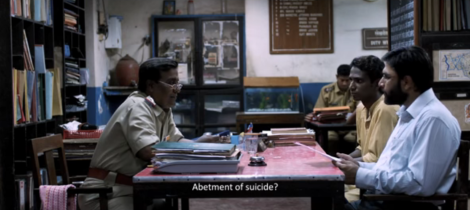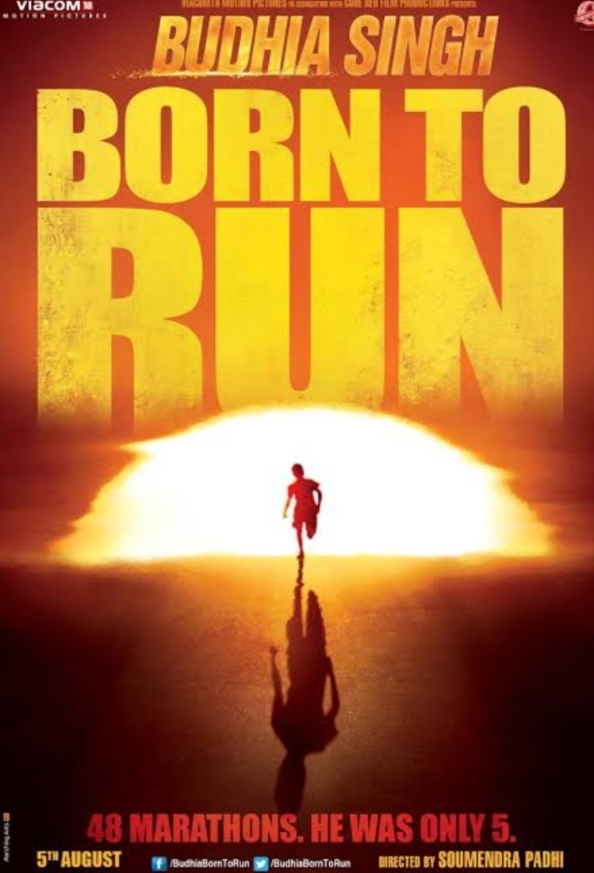aaLAWchak: State v. Narayan Kamble (Court)
“As real as it gets”
Movie: Court
Starring: Vira Sathidar, Vivek Gomber, Geetanjali Kulkarni, Pradeep Joshi and Usha Bane
Written & Directed by: Chaitanya Tamhane
Year of Release: 2015
Court is a very harsh and satirical comment on the ethos of this country. Interestingly, the writer has chosen to comment upon them through the system of judiciary and putting Court Room as a background.
The movie is immensely realistic. Every part of the movie appears to be usual day chores that happen around us.
The movie is predominantly in the Marathi language and the premise is set in Mumbai. The movie depicts Mumbai Chhawls, slums, police stations, Court rooms, government hospitals, etc. in all their rustic glory and in a very authentic manner.
The story starts in a Mumbai Chhawl where, Narayan Kamble, is teaching general knowledge to some of his students. After some time, he leaves for a performance. As he is performing a song along with his student troops, he is arrested by the police.
Later, we come to know that he has been charged under Section 306 of the Indian Penal Code, 1860 for abetment of suicide of a manhole worker. The case of the police is that the deceased manhole worker committed suicide after listening to one of the songs written and performed by the accused.
The Hon’ble Court takes cognizance of the matter. Charges are framed against the accused and the matter proceeds for trial.
There is no single protagonist in the story. There are multiple characters, everybody having a brief background. Other than the Defence lawyer, no other character is fleshed out well.
The director comments on the investigative machinery, attitude of the public prosecutor, victorian laws dating back to 1857, religious sentiments of certain sects, safety norms and conditions of manhole workers, immigrant issue in Maharashtra of people from Uttar Pradesh and Bihar, Sedition and myriad other topics. The film delivers, as it compels it’s viewers to think as to the society we are living in and what the future might be.
Court has one of the most abrupt endings, we have ever seen in a movie. From the ending, it was realized that the only wrong doer is the person caught, rest everybody is innocent. The performances are top notch. Specially, Geetanjali Kulkarni, who plays the public prosecutor Nutan.
Vivek Gomber, who plays the defence lawyer also performs exceedingly well. Most of the sophisticated lawyers conduct themselves in a similar manner.
The story is appreciative. However, the idea is superlative. The script could have been more tight. One tends to get weary in certain scenes. The Court room scenes are so well directed and performed that you actually feel like you are in a Court room. They are commendable observational prospect for a practicing lawyer as well as a law student.
Though there is no dearth of good scenes in the movie, in our opinion the best three gem of a scene in the movie are (a) the one where a defence lawyer is cross examining the victim in a stolen watch case; (b) Where more than 20 people plead guilty of travelling in the handicapped compartment of the Local Train and are let off by paying a fine of Rs. 500/-;
and (c) where the defence lawyer is shamed by a group of people from Goymari (fictional community) sect for a remark he made in Courtroom.
All these three scenes, especially the last one are a mirror of our society and the times we live in.
When Court was released in India, we remember that it was released in only two theatres in Delhi. Such films which have a strong message are sometimes lost into oblivion as they are not widely marketed and promoted.
We would not say, Court is not to be missed or that it is a brilliant film. We would say, that it is one of the most realistic Court room drama ever to hit the Indian celluloid.
It implores you to think. Watch it on a Sunday evening over a cup of tea on your cushy sofa. You will understand and appreciate what we are saying.
We leave you with the international trailer of the film.
Trivia:
• Court has received the National Award for best film in 62nd National Film Awards
• It was selected as India’s official entry to Oscars in the Category of ‘Best Foreign Language Film’
• Court also won Best film at the 71st Venice International Film Festival
Legal Aspects:
Abetment of Suicide: As per Section 306 of the Indian Penal Code, If any person commits suicide, whoever abets the commission of such suicide, shall be punished with imprisonment of either description for a term which may extend to ten years, and shall also be liable to fine. The office is Cognizable, Non-bailable, Non-compoundable and Triable by Court of Session.
As per, Pallem Deniel Victoralions Victor Manter v. State of Andhra Pradesh; (1997) 1 Crimes 499 (AP), to attract the ingredients of abetment, the intention of the accused to aid or instigate or abet the deceased to commit suicide is necessary.












